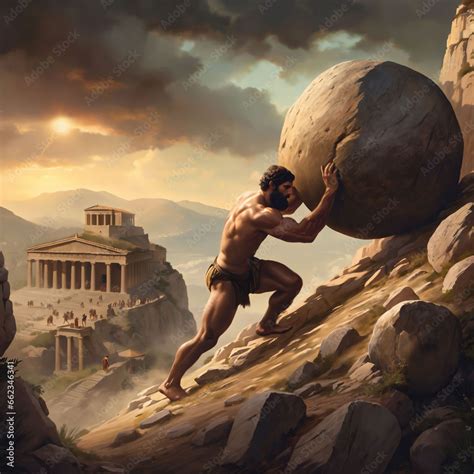In the vast expanse of Greek mythology, there exist numerous tales of gods, goddesses, heroes, and mortals, each with their unique stories and lessons. One of the most fascinating and thought-provoking myths is that of Sisyphus, a figure who has become synonymous with futile labor and the human condition. The story of Sisyphus is a complex tapestry of themes, including the inevitability of fate, the nature of punishment, and the resilience of the human spirit.
To delve into the myth of Sisyphus, it is essential to understand the context in which his story unfolds. Sisyphus was a king of Corinth, known for his cunning and his ability to outwit even the gods. His exploits and transgressions, particularly his attempt to cheat death, led to a punishment that would become the defining feature of his mythological legacy. The gods, in their infinite wisdom and power, condemned Sisyphus to roll a massive boulder up a hill, only for it to roll back down each time he neared the top, requiring him to start anew.
This eternal cycle of labor, where Sisyphus struggles against the forces of nature and the will of the gods, raises profound questions about the nature of existence and the human condition. It challenges the notion of purpose and meaning in a seemingly indifferent or even hostile universe. Despite the futility of his task, Sisyphus continues, driven by a compulsion that is both a curse and a peculiar form of liberation. His determination in the face of futility has inspired philosophical and existential interpretations, most notably by Albert Camus, who saw in Sisyphus a symbol of defiance and living in the present.
The myth of Sisyphus also invites a comparative analysis with other figures in Greek mythology who suffered similar fates, such as Tantalus and Prometheus. Tantalus, doomed to stand in a pool of water that always receded when he tried to drink, and to hang under fruit trees whose branches withdrew when he tried to eat, presents another aspect of eternal frustration. Prometheus, chained to a rock for stealing fire from the gods, only to have his liver eaten by an eagle each day, signifies the punishment for daring to challenge divine authority. These comparisons highlight the diversity of punishments and the various themes explored in Greek mythology, ranging from the consequences of hubris to the nature of justice and mercy.
One of the most compelling aspects of Sisyphus’s story is its historical evolution and the various interpretations it has garnered over time. From ancient Greek texts to modern philosophical treatises, the myth of Sisyphus has been dissected and analyzed, revealing new layers of meaning and symbolism. This Historical Evolution not only showcases the dynamic nature of mythological narratives but also underscores the timeless appeal of Sisyphus’s plight, which continues to resonate with audiences across different cultures and epochs.
In a more technical breakdown, the punishments in Greek mythology, including that of Sisyphus, often serve as cautionary tales about the dangers of disobeying the gods and the natural order. They illustrate the technical aspects of myth creation, where moral lessons are conveyed through vivid imagery and dramatic storytelling. This Technical Breakdown of mythological themes and motifs provides insight into the societal values and fears of ancient civilizations, highlighting the complex interplay between religion, morality, and the human condition.
For those seeking a Resource Guide to delve deeper into the world of Greek mythology and the story of Sisyphus, there are numerous texts, both ancient and modern, that offer comprehensive insights. From the works of Homer and Sophocles to the philosophical musings of Albert Camus, the literature on Sisyphus is vast and varied. Additionally, exploring the artistic depictions of Sisyphus throughout history, from ancient pottery to modern sculpture, can provide a unique perspective on how this mythological figure has been perceived and reinterpreted over time.
When considering the Decision Framework for understanding the myth of Sisyphus, it is crucial to evaluate the various themes and interpretations that emerge from his story. This involves analyzing the myth through different lenses, including philosophical, historical, and cultural perspectives. By doing so, one can gain a deeper understanding of the complexities inherent in the myth and its enduring relevance to human experience.
In conclusion, the myth of Sisyphus is a rich and multifaceted narrative that offers insights into the human condition, the nature of existence, and the complexities of mythological storytelling. Through its various interpretations and analyses, this myth challenges readers to ponder the meaning of life, the inevitability of fate, and the resilience of the human spirit in the face of adversity. Whether seen as a cautionary tale, a symbol of defiance, or a reflection of our own struggles and aspirations, the story of Sisyphus remains an indispensable part of our cultural heritage, inviting us to reflect on our existence and our place within the grand tapestry of human experience.
What is the significance of Sisyphus’s punishment in Greek mythology?
+Sisyphus’s punishment signifies the consequences of defying the gods and the natural order. It also serves as a symbol of the human condition, where individuals often find themselves in futile or endless struggles, yet continue to persevere.
How does the myth of Sisyphus relate to existentialism and philosophy?
+The myth of Sisyphus has been interpreted by philosophers like Albert Camus as a symbol of existential defiance. Despite the futility of his task, Sisyphus continues, illustrating the human desire to find meaning and purpose in life, even in the most absurd or challenging circumstances.
What lessons can be derived from a comparative analysis of Sisyphus with other figures in Greek mythology?
+A comparative analysis with figures like Tantalus and Prometheus highlights the diversity of themes in Greek mythology, including the consequences of hubris, the nature of justice, and the human condition. It also underscores the importance of respecting the natural order and the authority of the gods.


